 |
 |
 |
 |
 |
 |
 |
 |
 |
 |
 |
 |
 |
 |
 |
 |
|
 | | Dialogue 2: |  Bridging the Urban Divide: Inclusive Cities Bridging the Urban Divide: Inclusive Cities |  |  |
 |  Bijal Bhatt is a Co-ordinator at the Mahila Housing SEWA Trust, a housing service organization promoted by the Self Employed Women’s Association (SEWA). She is a Civil Engineer, and has over 12 years of experience in housing issues for the poor. Bijal Bhatt is a Co-ordinator at the Mahila Housing SEWA Trust, a housing service organization promoted by the Self Employed Women’s Association (SEWA). She is a Civil Engineer, and has over 12 years of experience in housing issues for the poor. |  |  |  |
 |  Alfonso Xavier Iracheta Cenecorta An architect, a graduate of the Autonomous University of the State of Mexico, with a Master's Degree in Urban Planning from the University of Edinburgh, Scotland; Doctor's Degree in Regional Studies from the University of Warsaw, Poland. He specialized in Regional Development Planning in Buenos Aires, Argentina; in Metropolitan Administration in Rio de Janeiro, Brazil at the Getulio Vargas Foundation and in Environment and Development, in Mexico. Alfonso Xavier Iracheta Cenecorta An architect, a graduate of the Autonomous University of the State of Mexico, with a Master's Degree in Urban Planning from the University of Edinburgh, Scotland; Doctor's Degree in Regional Studies from the University of Warsaw, Poland. He specialized in Regional Development Planning in Buenos Aires, Argentina; in Metropolitan Administration in Rio de Janeiro, Brazil at the Getulio Vargas Foundation and in Environment and Development, in Mexico. |  |  |  |
 | Robinson Njeru Githae Minister for Nairobi Metropolitan Development. Previously was the Assistant Minister for Local Government. He was born in 1957 in Central Province. He holds a Bachelor of Law (LLB) from the University of Nairobi and a Diploma from the Kenya School of Law. He is an advocate by profession and Member of Parliament (MP) for Ndia Constituency in Kirinyaga district. His Philosophy in life is: “Do the best you can”
http://www.communication.go.ke/ministry.asp?personid=96
|  |  |  |
 |  Abha Joshi-Ghani is Urban Sector Manager for the Finance, Economics, and Urban Department (FEU) in the Sustainable Development Network Vice Presidency.Ms. Joshi-Ghani, an Indian national, joined the Bank in 1992 as Financial Officer in the Cofinancing and Financial Advisory Services Department. In 1999, she was assigned to the East Asia Region’s Thailand Country Office as a Senior Infrastructure Specialist. Her most recent assignment was Lead Infrastructure Specialist in the Urban and Water unit of South Asia Region’s Sustainable Development Department. Abha Joshi-Ghani is Urban Sector Manager for the Finance, Economics, and Urban Department (FEU) in the Sustainable Development Network Vice Presidency.Ms. Joshi-Ghani, an Indian national, joined the Bank in 1992 as Financial Officer in the Cofinancing and Financial Advisory Services Department. In 1999, she was assigned to the East Asia Region’s Thailand Country Office as a Senior Infrastructure Specialist. Her most recent assignment was Lead Infrastructure Specialist in the Urban and Water unit of South Asia Region’s Sustainable Development Department. |  |  |  |
 | 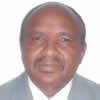 Adam Omar Kimbisa has been the Mayor of the City of Dar es Salaam since 2006. At the same time, he also works with Tanzania Red Cross as the Secretary General. He began working with the Tanzania Red Cross since 1986. From 1979-1982 he worked with the Ministry of Foreign Affairs and International Cooperation in Dar es Salaam as Foreign Service Officer. Adam Omar Kimbisa has been the Mayor of the City of Dar es Salaam since 2006. At the same time, he also works with Tanzania Red Cross as the Secretary General. He began working with the Tanzania Red Cross since 1986. From 1979-1982 he worked with the Ministry of Foreign Affairs and International Cooperation in Dar es Salaam as Foreign Service Officer. |  |  |  |
 |  Peter Lanjouw, is Research Manager of the Poverty Group in the Development Economics Research Group of the World Bank. He is also an Honorary Fellow of the Amsterdam Institute of International Development, Netherlands. He completed his Ph.D. in economics from the London School of Economics in 1992. From 2003-2005, he was a visiting scholar at the Agriculture and Resource Economics department at UC Berkeley, and he held the appointment of Professor of Economics at the VU University of Amsterdam between September 1998 and May 2000. His research focuses on various aspects of poverty and inequality measurement as well as on rural development issues. Peter Lanjouw, is Research Manager of the Poverty Group in the Development Economics Research Group of the World Bank. He is also an Honorary Fellow of the Amsterdam Institute of International Development, Netherlands. He completed his Ph.D. in economics from the London School of Economics in 1992. From 2003-2005, he was a visiting scholar at the Agriculture and Resource Economics department at UC Berkeley, and he held the appointment of Professor of Economics at the VU University of Amsterdam between September 1998 and May 2000. His research focuses on various aspects of poverty and inequality measurement as well as on rural development issues. |  |  |  |
 | 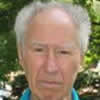 Peter Marcuse a planner and lawyer, is Professor Emeritus of Urban Planning at Columbia University in New York City. After practicing law for twenty years, specializing in labor and civil rights law, he was Professor of Urban Planning at UCLA, and President of the Los Angeles Planning Commission. His fields of research include city planning, housing, the use of public space, the right to the city, social justice in the city, globalization, and urban history. His current projects include a historically-grounded political history of urban planning, the formulation of a theory of critical planning. Peter Marcuse a planner and lawyer, is Professor Emeritus of Urban Planning at Columbia University in New York City. After practicing law for twenty years, specializing in labor and civil rights law, he was Professor of Urban Planning at UCLA, and President of the Los Angeles Planning Commission. His fields of research include city planning, housing, the use of public space, the right to the city, social justice in the city, globalization, and urban history. His current projects include a historically-grounded political history of urban planning, the formulation of a theory of critical planning. |  |  |  |
 |  Edgar Pieterse is holder of the NRF Research Chair in Urban Policy. He directs the African Centre for Cities at the University of Cape Town. Edgar’s research is wide-ranging covering themes such as African urbanism, cultural planning, regional development, inclusive governance and macro development issues. He regularly provides advisory services to international development agencies. Professor Pieterse holds a PhD from London School of Economics, an MA in Development Studies from the Institute of Social Studies (The Hague, The Netherlands) and BA-Honours from the University of the Western Cape (Cape Town). Edgar Pieterse is holder of the NRF Research Chair in Urban Policy. He directs the African Centre for Cities at the University of Cape Town. Edgar’s research is wide-ranging covering themes such as African urbanism, cultural planning, regional development, inclusive governance and macro development issues. He regularly provides advisory services to international development agencies. Professor Pieterse holds a PhD from London School of Economics, an MA in Development Studies from the Institute of Social Studies (The Hague, The Netherlands) and BA-Honours from the University of the Western Cape (Cape Town). |  |  |  |
 | 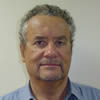 Pasqualino Procacci is a medical doctor with a background in public health and works for the Directorate General for Development Cooperation of the Italian Ministry of Foreign Affairs (Cooperazione Italiana). Dr. Procacci’s assignments have included following health programmes supported by the Italian Government around the world, as well as heading the Development Cooperation Offices in Former Yugoslavia and China. Currently Dr. Procacci heads the sub-regional Development Cooperation Office in Kenya, which has the mandate for Kenya, Somalia, Tanzania and the Seychelles. Dr. Procacci, in his current capacity, is responsible for an innovative debt conversion programme, bilaterally implemented by the Italian and Kenyan Governments. The Programme aims at improving living conditions of people in Korogocho, an informal high-density settlement on the outskirts of Nairobi. Pasqualino Procacci is a medical doctor with a background in public health and works for the Directorate General for Development Cooperation of the Italian Ministry of Foreign Affairs (Cooperazione Italiana). Dr. Procacci’s assignments have included following health programmes supported by the Italian Government around the world, as well as heading the Development Cooperation Offices in Former Yugoslavia and China. Currently Dr. Procacci heads the sub-regional Development Cooperation Office in Kenya, which has the mandate for Kenya, Somalia, Tanzania and the Seychelles. Dr. Procacci, in his current capacity, is responsible for an innovative debt conversion programme, bilaterally implemented by the Italian and Kenyan Governments. The Programme aims at improving living conditions of people in Korogocho, an informal high-density settlement on the outskirts of Nairobi. |  |  |  |
 | | Judith Rodin is president of the Rockefeller Foundation. She was previously president of the University of Pennsylvania and the first woman to lead an Ivy League institution. In four years at the Rockefeller Foundation, Dr. Rodin recalibrated its focus for the 21st century. Today, the Foundation works to ensure that more people can tap into globalization’s benefits while developing stronger resilience to its risks. Foundation initiatives include efforts to mobilize an agricultural revolution in sub-Saharan Africa, bolster economic security for American workers, inform more equitable, sustainable transportation policies in the United States, assure access to affordable, high-quality health systems in developing countries, and help vulnerable communities cope with the impacts of imminent and worsening climate change. For more information, visit www.rockfound.org |  |  |  |
 | | Carlos Vainer is an economist and sociologist, doctor on social and economic development – Université de Paris I, Panthéon/Sorbonne. Full Professor and three time director of the Institute of Urban and Regional Planning and Research at the Federal University of Rio de Janeiro (IPPUR/UFRJ), he has been Executive Secretary and President of the Brazilian National Association of Graduate Schools and Research on Urban and Regional Planning (ANPUR). At IPPUR, he chairs the Laboratory State, Labor, Territory and Nature (ETTERN), where he develops researches and advises students´ researches on regional and urban policies, migrations, social and environmental impacts of large dams, large urban projects, urban conflicts, and social movements in the context of globalization. He has published books and articles on these topics. |  |  |  |
 | Ann M. Veneman
Ann M. Veneman became UNICEF’s fifth Executive Director in 2005. She works on behalf of the UN children’s agency to help children around the world survive and thrive by advocating for and protecting their rights. UNICEF advances programs that support child health and nutrition, quality basic education, the protection of children from violence, exploitation and AIDS, and access to clean water and sanitation, among other priorities. Ms. Veneman has travelled to more than sixty countries to review the plight of children and UNICEF’s work to assist them. Pic © UNICEF photographs |  |  |  |
 | | Claudio Acioly joined the United Nations Human Settlements Programme (UN-HABITAT) in March 2008 and is currently its chief Housing Policy Section. He is the coordinator of the dialogue 3 of the fifth World Urban Forum. He has 27 years of experience and has worked in more than 20 countries as practitioner, technical advisor, development consultant and training and capacity building expert prior to joining UN-HABITAT. He has previously worked as a consultant to the World Bank, United Nations Development Programme (UNDP), the United Nations Economic Commission for Europe (UNECE) and Cordaid, Netherland’s largest international NGO, and has been a fellow with the Lincoln Institute of Land Policy (Cambridge, USA). As a housing practitioner, Acioly has an all-round experience with the design, implementation and management of citywide slum upgrading programmes drawn from various years of work in the government of Brasilia and in the city of Bissau, Guinea-Bissau. He has also drafted housing policy documents and managed participatory area-based planning processes in these cities. |  |  |  |
 | | Banashree Banerjee is an urban planner, working as an independent consultant and also as an associate staff member of the Institute for Housing and Urban Development Studies-IHS, Rotterdam. In a career spanning three decades, the focus of her work has been on inclusive approaches to urban planning and management, particularly related to the poor, where land and housing have a critical position. She has been responsible for designing, implementing and institutionalizing participatory planning and monitoring at neighbourhood and city levels and putting in place city-wide approaches to improvement of informal settlements in a number of cities. This has also involved national and provincial level policy inputs, institutional development and capacity building of local government and civil society organisations. Her other interest is urban land management, in which she has considerable experience related to practice, research and teaching. In particular she has worked on approaches to making land and housing available to the poor. |  |  |  |
 | Nabil Bonduki is an architect who holds a Master’s and a PhD in Environmental Urban Structures from the University of São Paulo (USP). Since 1986 he lectures and conducts research in the broad housing area and is currently a professor at the Faculty of Architecture of USP. He has published more than hundreds articles in specialized journals, newspapers, congress annals and has contributed to chapters of several books. He is the author of eleven books, including the award-winning Origens da Habitação Social no Brasil [Origins of Social Housing in Brazil]. Nabil is also curator of various exhibitions on housing and urban planning and is a frequent conference speaker in many cities in Brazil as well as in Latin American, Africa and Europe. He was president of the Architects’ Union of Sao Paulo (1986-89) and was one of the coordinators of the national social mobilization for urban reform and for the recognition of the right to housing in the 1988 Constitution. This social mobilisation was key for the insertion of an urban policy chapter in the Brazilian constitution and later in the enactment of Brazil’s progressive legislation “Statute of the City”.
|  |  |  |
 | | Adolfo Carrión Jr. is the first Director of the White House Office on Urban Affairs and Deputy Assistant to the President. Director Carrión is charged with coordinating the policies of 10 cabinet agencies into an effective agenda for urban America. Carrión brings a record of success on issues ranging from housing, to employment, to drug control, in urban areas. Serving as Borough President of the Bronx for 7 years prior to assuming his current appointment, Carrión oversaw significant increases in affordable housing, urban employment, and progressive change to one of the country’s most dynamic and challenging counties. |  |  |  |
 | | Dan Ericsson is a politician and government official by profession. He graduated in Political science and economics from the Stockholm University. His profession was consultant and communications adviser 2000 – 2006. Since then he is State Secretary at the Ministry of Finance. In the political arena he has been a Member of the Swedish Riksdag (Parliament) since 1991 to 2000 and at various times Member of the Committee on Agriculture, the Committee on the Labour Market, the Committee on Finance, the Committee on EU Affairs, The Riksdag’s Committee on Administration and Nominations Committee, Member of the Advisory Board of the Christian Democrat political Group in the Riksdag. During 1998-2000 he was the chair of the Riksdag’s Committee on Agriculture and Environment. |  |  |  |
 | | Jaime A. Fabiaña is currently the Chief Executive Officer of the Home Development Mutual Fund, more popularly known as Pag-IBIG Fund, a government financial institution involved in mobilizing provident funds primarily for shelter finance. Starting as Administrative Officer of the organization in 1981, he rose from the ranks occupying various Managerial positions in the organization, including Regional Vice President, Deputy Chief Executive Officer and Chief Executive Officer. |  |  |  |
 | | Inês da Silva Magalhães is a sociologist by profession, specialised in management planning. She joined the Ministry of Cities of Brazil in 2003 as director of informal settlement upgrading of the National State Secretariat of Housing. Since 2005 she is the National State Secretary of Housing and primarily responsible for the formulation and implementation of Brazil’s national housing policy and the National Housing Plan, which includes a number of projects of Housing PAC-Programme for Accelerated Growth and the National Housing Programme “Minha Casa Minha Vida”. Ines has drawn her public policy experience from several years of work at the municipal level but also in the third sector in Brazil. She worked for the non-governmental organization URBIS where she was director of projects, assisting municipal governments in the development and implementation of their participatory strategic municipal management plans (1998-2002). |  |  |  |
 | 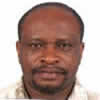 Eric Makokha is the Chief Executive Officer of Shelter Forum, a membership, networking and advocacy Non-Governmental Organization working in Kenya but with connections to several networks in and outside Africa.Eric is a Sociologist by training and holds a Masters degree in Sociology (University of Guelph) and a Bachelor’s degree in Sociology and Literature (University of Nairobi). He also has a post-graduate diploma in urban management: governance, planning and finance (Institute of Housing and Urban Development, Rotterdam) and a Certificate in Rural Development Management (Institute of Rural Management, Gujarat, India). Eric Makokha is the Chief Executive Officer of Shelter Forum, a membership, networking and advocacy Non-Governmental Organization working in Kenya but with connections to several networks in and outside Africa.Eric is a Sociologist by training and holds a Masters degree in Sociology (University of Guelph) and a Bachelor’s degree in Sociology and Literature (University of Nairobi). He also has a post-graduate diploma in urban management: governance, planning and finance (Institute of Housing and Urban Development, Rotterdam) and a Certificate in Rural Development Management (Institute of Rural Management, Gujarat, India). |  |  |  |
 | Mark Napier is programme director of (Urban Land Markets Programme Southern Africa), a programme sponsored and financed by the United Kingdom’s Department for International Development-DFID in South Africa which focuses on making urban land markets work better for the poor. Urban LandMark aims to influence policies and practices in South Africa to improve poor people's access to well-located urban land by making market, land planning and management systems work better, and particularly for the poor, giving effect and meaning to the idea of people having a right to land. Urban LandMark plays a catalytic role in bringing people together for dialogue. By enabling debate between government, the private sector and civil society, the programme aims to help all role players reach an understanding of the problems and how they may be tackled. Gradually, its home-based work is spreading to neighbouring countries and also to regional scope due to cooperation with UN-HABITAT, the Global Land Tool Network-GLTN and other international agencies with interest in urban land policies.
|  |  |  |
 | Barry Pinsky has worked for over 30 years in all aspects of low-income housing development from grassroots housing projects to municipal and national policy. He is one of the pioneers of the modern cooperative housing movement in Canada. He helped establish one of the first housing co-op NGOs in Canada, and developed numerous community based non-profit co-op housing projects in Montreal and Greater Toronto Area. He has also carried this experience to numerous countries overseas. He worked on the first slum upgrading project in post-independent Mozambique where he also prepared the first guidelines for urban land use controls. An architect and urban planner by training, he is the Executive Director of Rooftops Canada - Abri International, the international development program of cooperative and social housing groups in Canada. During his tenure, Rooftops Canada has mobilized over $20 million to build the capacity of housing partners and it has helped leverage over $120 million in housing activity, primarily in sub-Saharan Africa. More recently, this has included a six-year project to strengthen the social housing sector in South Africa, a post-tsunami housing program in Aceh, Indonesia, and an ongoing African regional program on HIV, AIDS and human settlements.
|  |  |  |
 | | Sonia Castedo Ramos is the Mayor of Alicante. She was born in Ribadeo, Galicia on 23 December 1970, and has been living in Alicante since her childhood. She is married with one daughter. She graduated from the University of Alicante with a degree in Sociology before starting her political career in 1993. In 1995, she joined the press office and became Chief Press Officer in 1997. In 1999 she was elected a member of Alicante City Council and served as Town Councillor for Tourism, Beaches and Rural Areas. In 2003, she became the first deputy to the mayor. On September 17, 2008, Sonia Castedo was elected Mayor of Alicante. She is the first woman ever to occupy this position in Alicante. As mayor of the city, Mrs. Castedo introduced a series of innovations in housing the elderly and the youth, in addition to take firm policies to consolidate a clean and sustainable city. |  |  |  |
 | | Evaniza Rodrigues is a social worker, a community leader from Sao Paulo, Brazil with vast experience with popular community movements and participatory housing development processes. She is a well known housing rights activist in Brazil. She is the executive coordinator of the National Union for Popular Housing of Brazil, the key organisation working on social mobilisation for adequate housing. She is a member of the Pastoral for Housing of the Catholic Church in Sao Paulo. She was an active member of the national coordination committee of the National Forum for Urban Reform, a national coalition of social urban movements and civil society organisations that lobby for urban and housing reforms. She has also been member of the Housing Project of the Institute of Citizenship. She was director of the Habitat International Coalition and of the Latin American secretariat for Popular Housing, and was chief of staff of the National State Secretariat for Urban Programmes of the Ministry of Cities. |  |  |  |
 |  Raquel Rolnik is an architect and urban planner, with over 30 years of experience in planning and urban land management. She has a large experience in the implementation and evaluation of housing and urban policies. In May 2008, Raquel was appointed the second United Nations Special Rapporteur on the right to adequate housing. Based in Sao Paulo, she is a professor at the Faculty of Architecture and Urbanism of the University of São Paulo and is the author of several books and articles dealing with urban development and planning. Raquel Rolnik is an architect and urban planner, with over 30 years of experience in planning and urban land management. She has a large experience in the implementation and evaluation of housing and urban policies. In May 2008, Raquel was appointed the second United Nations Special Rapporteur on the right to adequate housing. Based in Sao Paulo, she is a professor at the Faculty of Architecture and Urbanism of the University of São Paulo and is the author of several books and articles dealing with urban development and planning. |  |  |  |
 | 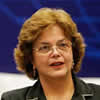 Dilma Roussef is a Brazilian economist with a solid experience in government and public policy formulation and implementation at municipal, state and national levels. She is currently the minister of civil affairs and chief of staff of the Presidency of Brazil (since June 2005). Ms. Roussef has been an outspoken voice for equal distribution of resources and sustainable economic development that safeguards the needs of poor households while enhancing business opportunities in the economy. She is the initiator and mastermind of Brazil’s programme of accelerated growth (PAC) as well as Brazil’s billion dollars housing programme “Minha Casa Minha Vida” (My house My Life Programe) through which the Ministry of Cities is providing adequate housing to millions of Brazilians in a cooperation between the Federal Government, Municipal and State Governments, Private Sector and Organised Community-based Housing Associations. Dilma Roussef is a Brazilian economist with a solid experience in government and public policy formulation and implementation at municipal, state and national levels. She is currently the minister of civil affairs and chief of staff of the Presidency of Brazil (since June 2005). Ms. Roussef has been an outspoken voice for equal distribution of resources and sustainable economic development that safeguards the needs of poor households while enhancing business opportunities in the economy. She is the initiator and mastermind of Brazil’s programme of accelerated growth (PAC) as well as Brazil’s billion dollars housing programme “Minha Casa Minha Vida” (My house My Life Programe) through which the Ministry of Cities is providing adequate housing to millions of Brazilians in a cooperation between the Federal Government, Municipal and State Governments, Private Sector and Organised Community-based Housing Associations.
|  |  |  |
 | | Kecia Rust has seventeen years experience in the low-income housing policy sector in South Africa. Since 1997, she has operated as an independent consultant, specialising in housing policy and development. She has a broad based and in-depth knowledge of South Africa’s housing policy and has undertaken and commissioned research into a wide range of topics including housing and property markets, access and affordability, micro finance and incremental housing processes, rental and social housing, the creation of sustainable human settlements, and the impact of HIV and AIDS on social housing institutions. Recently, Kecia’s focus has been on housing finance. Since July 2003, she has been the coordinator of the FinMark Trust’s housing finance theme area, and has established the Centre for Affordable Housing Finance in Africa, as a division of the FinMark Trust. |  |  |  |
 | | David A. Smith is the founder of the Affordable Housing Institute-AHI, a non-profit international consultancy specializing in affordable housing program design and development, based in Boston USA. With more than thirty years' direct experience in affordable housing finance, David uniquely combines the roles of practitioner and theoretician, participant and policymaker. As an international housing finance policy advisor/ program developer he works with housing finance program development engagements throughout the world, including the USA. AHI is financial advisor to several thought-leading pro-poor institutions (amongst them are the Urban Poor Fund of Slum Dwellers International, the Mahila Housing SEWA Trust of Ahmedabad/ India; the Affordable Homes Partnership, an instrumentality of the Irish government. AHI has also worked in Brazil, Egypt, India, Italy, Kenya, Sri Lanka, South Africa, South Africa, Turkey, and United Kingdom. The institute was recently awarded with a two-year, $1,000,000 research grant by the Bill & Melinda Gates Foundation. |  |  |  |
 | | Martim Smolka is an economist graduated from the Pontifical Catholic University of Rio de Janeiro (1971), MA. and PhD in Regional Science from the University of Pennsylvania, USA, 1980. Since 1995, he has been a senior staff of the Lincoln Institute of Land Policy and director of the institute’s Latin American Program working and supporting land policy debates in nearly all countries of Latin America, ranging from Mexico to Argentina. He directs research and educational programs on issues relating to land markets and land policies. He was a faculty member of the Urban and Research and Planning Institute (IPPUR) at the Federal University of Rio de Janeiro, a co-founder and president for 2 terms of the Brazilian National Association for Research and Graduate Studies on Urban and Regional Planning (ANPUR). He was also a Fellow of the Brazilian National Council for Research (CNPq). |  |  |  |
 | Gustavo González Soto is a Uruguayan housing cooperative campaigner. He is a teacher by profession and since 1976 he is associated with the housing cooperative for mutual aid movement of Uruguay. He has been an active member and leading personality of the FUCVAM (Uruguayan Federation of Housing Cooperatives and Mutual Aid) occupying its executive secretariat and presidency for different periods. He is founder of the FUCVAM Training Centre and co-founder of the SELVIP (Latin American Secretariat of Public Housing). For many years Gustavo has been actively participating in the Latin American and global conferences and General Assemblies of HIC (Habitat International Coalition). He is also a member of the Housing Advisory Commission for the Municipal Housing Program of the Municipality of Montevideo (1990) and has partnered with the National Housing Union Movement of Brazil in promoting cooperative models in Brazil and other countries of Latin America. He has specialised in organising exchanges and internships among social urban movements and housing cooperative organizations of Latin America.
|  |  |  |
 |  Graham Tipple is with the University of Newcastle. He was one of the moderators of the internet-based that preceded the sessions in Rio de Janeiro and one of the authors of report and background document of the Dialogue on Equal Access to Shelter. Graham is the official rapporteur of the Dialogue 3 of the Fifth World Urban Forum. He has over 30 years experience in housing and urban development issues in developing countries at national and city level. He spent seven years working in Africa (Zambia and Ghana). He has published over a hundred papers on urban policy in Africa and the developing world in general. Graham Tipple is with the University of Newcastle. He was one of the moderators of the internet-based that preceded the sessions in Rio de Janeiro and one of the authors of report and background document of the Dialogue on Equal Access to Shelter. Graham is the official rapporteur of the Dialogue 3 of the Fifth World Urban Forum. He has over 30 years experience in housing and urban development issues in developing countries at national and city level. He spent seven years working in Africa (Zambia and Ghana). He has published over a hundred papers on urban policy in Africa and the developing world in general. |  |  |  |
 |  Kandeh K. Yumkella is the Director General of the United Nations Industrial Development Organistion (UNIDO). On 7 December 2009, at the UNIDO General Conference, Thirteenth Session, Mr. Yumkella, a national of Sierra Leone, was reconfirmed for a second term in office. As the first Director-General from Sub-Saharan Africa, Yumkella's first term in office formally began on 8 December 2005. Yumkella joined UNIDO in 1996 as Special Advisor to the then Director-General, Mauricio de Maria y Campos. In the same year he became Director of the Africa and Least Developed Countries Regional Bureau, until 2000 when he went to Nigeria as UNIDO Representative and Director of the Regional Industrial Development Centre, a position he held until 2003. From then until his election as Director-General he was a Senior Advisor to the previous Director-General, Carlos Magariños. Kandeh K. Yumkella is the Director General of the United Nations Industrial Development Organistion (UNIDO). On 7 December 2009, at the UNIDO General Conference, Thirteenth Session, Mr. Yumkella, a national of Sierra Leone, was reconfirmed for a second term in office. As the first Director-General from Sub-Saharan Africa, Yumkella's first term in office formally began on 8 December 2005. Yumkella joined UNIDO in 1996 as Special Advisor to the then Director-General, Mauricio de Maria y Campos. In the same year he became Director of the Africa and Least Developed Countries Regional Bureau, until 2000 when he went to Nigeria as UNIDO Representative and Director of the Regional Industrial Development Centre, a position he held until 2003. From then until his election as Director-General he was a Senior Advisor to the previous Director-General, Carlos Magariños. |  |  |  |
 | | Shamsul amri Baharuddin He is one of the leading social anthropologists in Southeast Asia, Malaysia. He has devoted his research to tackling the problems of Malaysia, a classic example of a multi-ethnic society. The issues he has addressed include reconciliation between different ethnic groups, resolution of religious conflict and poverty mitigation. His achievement in the three fields of academic research, social criticism and education has been outstanding. |  |  |  |
 | | Analucy Bengochea Coordinator of the Garifuna Emergency Committee of Honduras. The Garifuna Emergency Committee is an organization that was created in response to Hurricane Mitch in 1998. It is a member organization of GROOTS International, a global network of grassroots women’s organizations, and part of the Huairou Commission. They also work toward the preservation of the Garifuna culture. Ms. Bengochea has 15 years of experience as a community organizer in Garifuna communities and has been a leader in bringing the voice of grassroots women and indigenous to the global stage. |  |  |  |
 | | Hector Castillo Berthier Professor of Sociology at the National University of Mexico, Dr. Castillo Berthier works with Youth, Gangs, and Culture to bring innovative solutions to integrate and impulse youths as leaders of their communities. Creator of the Circo Volador (Flying Circus) he reaches over 35,000 young people in Mexico City every year through workshops, concerts and cultural events. |  |  |  |
 | | Peter Boothroyd is a planner with research, teaching, and capacity-building interests in participatory development. On behalf of UBC in the 1980s and 1990's, he led poverty-reduction capacity-building projects, funded by the Canadian International Development Agency, in partnership with universities and government institutions in Southeast Asia. Since 1998, he has directed UBC's CIDA-funded projects in Brazil, first on the theme of community-based urban wastershed management, and now on socially inclusive collaborative governance in metropolitan regions. He is intrigued by the potential of universities to become more socially engaged through better integration of their service, research, and teaching missions. |  |  |  |
 | | Steve Bradshaw is an Emmy Award-winning British broadcaster, journalist and film-maker. He currently presents and edits TVE and BBC World's Life on the Edge series about human dilemmas caused by globalization. He also presented their City Life series. Steve has written, reported and produced over 100 TV and radio documentaries from over 40 countries including for BBC Panorama and PBS Front Line. He’s won Peabody, Dupont, One World, and International Investigative Journalism awards. He’s a member of the International Consortium of Investigative Journalists. Steve's previously moderated sessions at World Urban Forums in Barcelona, Vancouver and Nanjing. |  |  |  |
 | | Zeca Camargo Presenter, Rede Globo (Brazilian Television), 46 years, is a presenter and a reporter of "Fantastic" – the sunday evening news program on TV Globo. In addition to programs with large showbizz "names" and other matters related to the young public – since 1998 Zeca develops different projects for the program which are linked to “space” and travel. At the moment, he is preparing for 2010 the series “Mega Cities - problems and solutions”, visiting some of the biggest human agglomerations of the world. |  |  |  |
 | | Brigitte Colin Programme Specialist of UNESCO, International Migration and Multicultural Policies Section. She joined UNESCO in 1982 in the cultural sector for the Arabian region. She has been a programme specialist since 1995, in charge of intersectorial urban projects. |  |  |  |
 | | Américo Córdula Secretary in charge of identity and cultural diversity - Brazilian Ministry of Culture. He encourages the diversity and multiplicity of the Brazilian identity and supports policies and programmes that consolidate cultural diversity by promoting indigenous people identity and culture; the recognition of the rights of minority and excluded groups to culture; education for tolerance to difference and the protection and dissemination of the different cultural expressions. |  |  |  |
 | | António Guterres became the 10th UN High Commissioner for Refugees in 2005. A former Portuguese prime minister, Guterres heads one of the world's foremost humanitarian agencies providing protection and assistance to millions of refugees, returnees, internally displaced people and stateless people. Before joining UNHCR, Guterres spent more than 20 years in government and public service. |  |  |  |
 | Erminia Maricato has a PhD from the Architecture and Urbanism Faculty, University of Sao Paulo, Brazil, where she is currently a Professor and a Member of the Research Council. She is member of four Scientific Boards of National and International Magazines and she has been awarded with the title “Architect of the Year” - National Federation of Architects and Urbanists in Brazil (2007).
Ms Maricato served as Deputy Minister of the Ministry of Cities of Brazil (2003-2005) and as President of the Brazilian Company of Urban Trains Administrative Council (2003-2005). |  |  |  |
 | | Edín Martínez Vice- Minister of Housing and Urban Development, El Salvador. |  |  |  |
 | | Joan Clos i Matheu Former Chair of UNACLA and Former Mayor of Barcelona from 1997 to 2006, during this period, he hold the first Universal Forum of Cultures. In 2006 he was appointed Minister of Industry, Tourism and Trade. At present he is the Spanish Ambassador in Turkey and Azerbaijan. |  |  |  |
 | | Arkebe Oqubay Minister of State for Urban Development, Ministry of Federal Affairs and Former Mayor of Addis Ababa, Ethiopia. Elected as part of the ruling Ethiopian People's Revolutionary Democratic Front coalition, on March 31, 2005 he was named "African Mayor of 2005" by Broadcasting Network of Africa. |  |  |  |
 | | Antonio Prado Deputy Executive Secretary for ECLAC, doctor in economy, over the past few years, Prado has analyzed anti-inflationary and development policies, first as economic advisor to the president of the government seat in the Brazilian Senate (2003-2004), and later as Head Officer for Government Affairs of the Presidency of the Brazilian National Bank for Economic and Social Development, BNDES (2005-2009). He has also published books and articles in Brazil’s specialized media. |  |  |  |
 | | Khalifa A. Sall Mayor of Dakar at present, he has worked as consultant for the World Bank and United Nations on the topics of democratic election process issues and capacity building of parliamentarians. He has been very active in promoting dialogue between African parliamentarian and similar groups in Europe and internationally. He has been mayor of Dakar for 16 years. |  |  |  |
 | | Mona Serageldin Vice President of the Institute for International Urban Development, Egypt. She retired in June 2008 from her position as Adjunct Professor of Urban Planning at the Harvard University Graduate School of Design where she had been a member of the faculty since 1985. She taught the course “Strategic Planning and Local Development” for 10 years, examining strategies for urban and regional development in a globalized economy where cities are the engines of growth. |  |  |  |
 | | TMG Sexwale Minister of Human Settlements, Pretoria, South Africa. A charismatic leader, he was imprisoned on Robben Island for his anti-apartheid activities, alongside figures such as Nelson Mandela. After the 1994 general election—the first universal franchise election in South Africa—Sexwale became the Premier of Gauteng Province. On 10 May 2009, South Africa's new President Jacob Zuma appointed the veteran Sexwale as Minister of Human Settlements. |  |  |  |
 | | Nicéphore Dieudonné Soglo Was Prime Minister of Benin from 1990 to 1991 and President from 1991 to 1996. He is at present Mayor of Cotonou since 2003. In 1993, as President, Dr. Soglo headed the Benin delegation which participated in the first Tokyo International Conference on African Development |  |  |  |
 | | C. Everald Warmington Elected President of the Governing Council of the United Nations Human Settlement Programme (UN-HABITAT) at its twenty-second session in Nairobi Kenya, for two years from March 30, 2009 until 201. He oversees all the work undertaken by UN-HABITAT, from work programmes to general operations. He is Minister of State for Water and Housing in Jamaica. |  |  |  |
 | | Georgia Butina Watson Professor of Oxford Brooks University, head of the Department of Planning. Her professional expertise lies in the area of urban morphology, urban regeneration and in developing approaches to involve local community groups in the improvement of local urban areas. She is presently involved in several national & international research projects which range from issues of local and regional identity to the regeneration of run down housing estates and the improvement of historic city centre areas. |  |  |  |
 | | Zoubida Allaoua is Director of the Finance, Economics and Urban Department at the World Bank. She is an economist, and joined the Bank in 1988 through the Young Professionals Program. She held various country economist positions on West African countries as well as on India and Pakistan. She led economic and sector work on macroeconomic, trade, financial sector, and private sector development policy issues as well as adjustment lending operations. In September 2002, she joined the MENA region as Sector Manager in the department responsible for Infrastructure, Finance and Private Sector development. (Source: http://web.worldbank.org) |  |  |  |
 | | Khalida Bouzar has been since September 2008: the Deputy Director, Division of Technology, Industry and Economics, UNEP, Paris. From October 2004 to September 2008 she was Climate Change Coordinator, Programme Management Department, International Fund for Agricultural Development (IFAD), in Rome, Italy. From May 2003 to October 2004 she was interim Director, Programmes in designated areas of work, Global Mechanism (GM) of the UNCCD, in Rome, Italy. From May 2000 to October 2004 she was Programme Manager for Asia, the Pacific and North Africa, International Fund for Agricultural Development (IFAD), Global Mechanism (GM) of the UNCCD, in Rome, Italy. From April 1998 to May 2000 she was Technical Expert, United Nations Development Programme (UNDP). |  |  |  |
 | | Vandana Chavan is an advocate by profession, was thrice elected as Councillor to the Pune Municipal Corporation from 1992 - 2007 and was Mayor of the City of Pune in the year 1997-98. She has spearheaded several initiatives in the city of Pune targeting mainly citizen’s participation, empowerment of women and sustainable development. Presently she is the Chairperson of the Environment Sub-Committee of the Mahratta Chamber of Commerce, Industry and Agriculture, Pune. Recipient of several awards and fellowships, including the prestigious Eisenhower Fellowship (USA), she is member of the 8 member Task Force of the Metropolis Women International Network Forum. Ms. Chavan has represented India at several international fora. |  |  |  |
 | | Martha Delgado-Peralta has served as the Secretary of the Environment for Mexico City since 2006. She is responsible for setting up the City’s Climate Action Plan, which undertakes specific actions to reduce greenhouse gas emissions. Mrs. Delgado has spent twenty years working in leadership positions dedicated to promoting sustainable development and civic responsibility, including the Unión de Grupos Ambientalistas, the Instituto Nacional de Ecología, and the Organization Presencia Ciudadana Mexicana. She is responsible for developing and implementing the Non-Motorized Transportation Program, which promotes the use of bicycles as sustainable and suitable means of transportation. (Source : http://www.iclei.org/index.php?id=9632#c38104) |  |  |  |
 | | Khady Diagne holds an MSc in Geography and has worked at the Urban Water and Sanitation Department and at the Camberene sewerage works in Senegal. She then joined ENDA-Tiers Monde’s Relay for Participatory Urban Development, where she managed several programmes including the Habitat and Sustainable Environment Network, relations between Governments and NGOs, (the Gongo projects), the Social Production of Habitat and the programme on flooding in Saint Louis. Since June 2008, she has been West Africa regional coordinator of the African Civil Society Network on Water and Sanitation (ANEW) |  |  |  |
 | Wim Elfrink is Executive Vice President, Cisco Services & Chief Globalisation Officer.
As Chief Globalisation Officer (CGO), Elfrink is leading the next stage of the Cisco globalisation strategy, and as Executive Vice President, Cisco Services, he is responsible for Cisco Services worldwide. In his functions, Elfrink is a member of the Cisco Board of Directors, is one of Cisco's top 5 executives worldwide. Elfrink joined Cisco in 1997, and under his leadership Cisco Services has been dedicated to accelerating customer success with Cisco network technology and applications. Cisco Services has created and now delivers award-winning customer support. |  |  |  |
 | | Arvinn Eikeland Gadgil has been Political Adviser for the Norwegian Minister of the Environment and International Development since June 2008. Prior to this post, he has was a Foreign Service Trainee at the Ministry of Foreign Affairs (2006-2008) and worked for the Norwegian Development Fund (2006) as well as the UN Association in Norway (2003-2004). Mr. Gadgil has been head of a focus group on international economics and trade in the Socialist Left Party (2007 - 2008) and is member of the Socialist Left Party International Committee (2007-). Mr. Gadgil holds a MSc in Development Studies from London School of Economics and Political Science. |  |  |  |
 | | Michelle Kooy is the Director of Urban Programs at Mercy Corps Indonesia. She brings to this position her expertise in international urban development, building on almost 10 years of research and relief experiences in Asia and the Middle East. Prior to Mercy Corps, Michelle’s international experience included work for CIDA and the Center for Refugee Studies, both based in Canada. Her research has been published in multiple academic and professional publications including the International Journal of Urban and Regional Research, the United Nations Human Development Report, and World Development. |  |  |  |
 | | Alain Lecomte is General Inspector for sustainable development administration. From 2007 to 2009 he was Director, Private Office of the Minister of Housing and the City, then of the Minister of Housing, Urban development; Deputy Director, Private Office of the Minister of Ecology, Energy, Sustainable Development and the Sea. From October 2009 he has been President of Sustainable Land Planning Section of the General Council of Environment and Sustainable Development in the Ministry of Ecology, Energy, Sustainable Development and the Sea. |  |  |  |
 | | Mongezi Mnyani is currently the Acting Head of the Department for the Gauteng Department of Local Government Housing and was appointed to this position in June 2009. He has worked for various government departments and has been in the public service since 1996. Mr. Mnyani has vast knowledge and expertise in the area of Human Settlements, Local Government, Public Sector Administration and Transformation, Public Private Partnerships, Stakeholder Management, Communications, Government Communications and Community Development and has been instrumental in setting up organizations and systems aimed at strengthening community participation in development. |  |  |  |
 | | Alexander Müller, is Assistant Director General of the natural resources and environment department that host the "Food for the cities" multidisciplinary initiative in the Food and Agriculture Organization of the United Nations. |  |  |  |
 | Konrad Otto-Zimmermann is the Secretary General of ICLEI – Local Governments for Sustainability, with more than thousand members in 68 countries the largest international network of metropolises, cities, towns and regions dedicated to sustainable development.
Mr. Otto-Zimmermann has several board and advisory functions such as with the International Green Purchasing Network, the International Centre for Sustainable Cities, and the Forum’s Agenda Council for Urban Management. He was lecturer at over 200 congresses, conferences, symposia and training sessions and initiator and scientific director of congresses on sustainable cities, Local Agenda 21, local environmental management, environmental impact assessment, non-motorized urban transport and eco-procurement. |  |  |  |
 | | Casius Pealer is an architect and attorney, currently working as the Director of Affordable Housing at the U.S. Green Building Council in Washington, DC. He previously worked as an Associate at a Washington, DC law firm where he was responsible for structuring and negotiating mixed-finance transactions to create affordable mixed-income housing. Prior to law school, Casius served as a Community Development Volunteer for the U.S. Peace Corps, teaching carpentry and small business skills in the West Indies. He holds a Masters in Architecture from Tulane University’s School of Architecture and a J.D. from the University of Michigan Law School. |  |  |  |
 | Mao Qizhi is a Professor of Urban Planning and Design, Associate Dean, at the School of Architecture, Tsinghua University.
Education: Dr.Eng.(Tsinghua Uni.), M.I.P.(Stuttgart Uni.), M.Eng.(Tsinghua Uni.), B.A.(Zhejiang Uni.)
Concurrent academic posts: Vice President, World Society for Ekistics (WSE); Academician,International Eurasian Academy of Sciences (IEAS); Consultant, Ministry of Housing and Urban-Rural Development, China; Deputy Director, International Cooperation Committee, Architecture Society of China;
Deputy Director, Urban Planning Education National Steering Committee, China; Executive chief-editor, China City Planning Review; Deputy chief-editor, China Urban Development Report |  |  |  |
 | | Ilmar Reepalu is Mayor of Malmö, Sweden. After doing his national military service, Reepalu moved to Gothenburg to attend Chalmers Technical University, where he took a degree in civil engineering focusing on roads and water (1968) and a degree in architecture (1970). During his time in Gothenburg Reepalu joined political groups that were trying to hinder the demolishment of the Haga neighborhood and the Dicksonska public library. From 1973 to 1977 Reepalu worked as city planner in Malmo. From 1977-1979 he was deputy director of city planning of Borås and from 1979 was employed by the Master (General) Planning Bureau in Malmö. (Source: http://en.wikipedia.org) |  |  |  |
 | | Mohamed Shareef is Deputy Minister for Housing, Transport and Environment (in charge of Environment and Climate Change), Republic of Maldives. |  |  |  |
 | | David Simon is Head of Department and Professor of Development Geography at Royal Holloway, University of London, UK. He is a former editor, and now vice-chair of the editorial board, of the Journal of Southern African Studies. He serves on the Scientific Steering Committee of the Urbanization and Global Environmental Change core project of the International Human Dimensions Programme on Global Environmental Change (IHDP), and is advising UN-HABITAT on cities and climate change and was part of their delegation at the Copenhagen Climate Summit (COP15) in December 2009. |  |  |  |
 | Ron Sims was unanimously confirmed by the U.S. Senate on May 6, 2009, and sworn in as the Deputy Secretary for the U.S. Department of Housing and Urban Development on May 8, 2009. At HUD, Sims is responsible for managing the Department's day-to-day operations. One of the hallmarks of the Sims Administration in King County was the integration of environmental, social equity and public health policies that produced groundbreaking work on climate change, health care reform, affordable housing, mass transit, environmental protection, land use, and equity and social justice. (Source : http://portal.hud.gov/portal/page/portal/HUD/about/principal_staff/deputy_secretary_sims)
|  |  |  |
 | | Jan Vapaavuori is a Finnish politician and cabinet member. As Minister of Housing at the Ministry of the Environment, he handles matters related to housing, building and land use planning. Mr Vapaavuori has been a member of parliament from the constituency of Helsinki since 2003. He has been a member of the Helsinki City Council since 1996 and the Chairman of the Helsinki City Board from 2005 to 2007. In 1989 Mr Vapaavuori completed a master's degree in law from the University of Helsinki. He continued his post-graduate studies in Helsinki, Uppsala, Sweden, and The Hague, Netherlands. |  |  |  |
 | | John Vidal has been environment editor of the Guardian newspaper in London for nearly 20 years. In that time he has reported on a wide range of issues from over 90 countries and won many awards including journalist of the year four times, the BBC food prize and the One World award for journalism. He is author of McLibel - Food Culture on trial, and has contributed to books on human rights, the Gulf war, and Europe. |  |  |  |
 | |
Dr Anne-Marie Tupuola is of Samoan descent born in New Zealand with indigenous and ancestral ties to Samoa’s villages of Lotofaga, Tufuiopa and Vaigaga. She specialises and has published extensively in the areas of human development, adolescent psychology, youth studies, gender studies, indigenous health and well-being, research methods, scholarship and epistemologies. Anne-Marie has been affiliated with Columbia, Harvard and New York Universities as a Fulbright Senior Scholar and was Visiting Professor and Visiting Scholar at New York University and Teachers College, Columbia University where she was awarded an Outstanding Teachers Award. Anne-Marie currently resides in London, UK and is Principal of Global Edge Research, an independent scholar, consultant, researcher, lecturer and freelance writer. (Indigenous Peoples in Urban Areas Roundtable) |
 |  |  |
 | | Irène Bellier Political Anthropologist, Senior Researcher at the National Center for Scientific Research, Director of the Laboratory for the Anthropology of Institutions and Social Organizations, and vice president of GEMDEV, Paris. She graduated from the Institute of Political Studies and followed on to complete a PHD in social anthropology, focusing on a small-scale society in the Peruvian Amazon forest. She is a political anthropologist, senior researcher at the National Center for Scientific Research, director of the Laboratory for the Anthropology of Institutions and Social Organizations, and vice president of GEMDEV, a research consortium for the study of globalization and development. Bellier is currently coordinating a new project which focuses on the conditions of implementation of the UN Declaration of the Rights of Indigenous Peoples. In the past she has written several publications on gender issues, Amerindian mythology, songs and cultures, European identity, French and European elites, administrative cultures and languages, and indigenous people’s issues.(Indigenous Peoples in Urban Areas Roundtable) |  |  |  |
 | Mr. Antonio Rodríguez Anthropologist and Assistant Secretary for Indigenous Peoples, Government of Ecuador. He currently serves as Assistant Secretary for Indigenous Peoples and Interculturality in the Ecuadorian Government. During the last fifteen years he has striven to promote the rights of indigenous peoples and nationalities, linked to training bodies and projects. He was coordinator and facilitator of the Leadership Training School of Indigenous Peoples to ECUARUNARI members. Rodriguez has worked with several NGOs on agricultural issues and local development. He was Coordinator of the Democracy and Governance Project at the Institute of Ecuadorian Studies, and has also coordinated regional initiatives for the School of Citizenship in Latin America.
He served on the Research Team of the Truth Commission and was adviser to the Minister of the Secretariat of Peoples, Doris Solis.(Indigenous Peoples in Urban Areas Roundtable) |  |  |  |
 | | Céleste McKay Director of Human Rights and International Affairs for Native Women’s Association of Canada. She is a Métis woman from Manitoba, with a background in social work and law.In 2007, Céleste received her LL.M. degree from the University of Ottawa which focused on the international right to health of Indigenous women in Canada. She has worked in the areas of human rights, policy, research and advocacy work, both nationally and internationally, primarily on behalf of Indigenous women’s organizations. Céleste is currently the Director of Human Rights and International Affairs for the Native Women’s Association of Canada. Her greatest source of joy is her son, Evan Raoul Chartrand.(Indigenous Peoples in Urban Areas Roundtable) |  |  |  |
|
|
|
 |
 |
 |
|
|
|